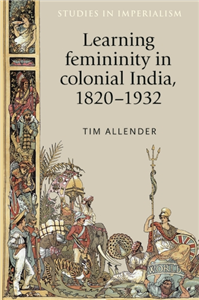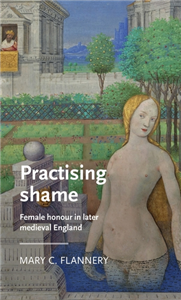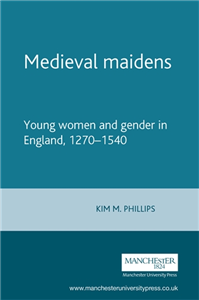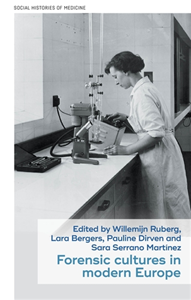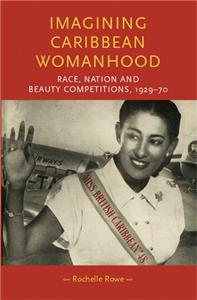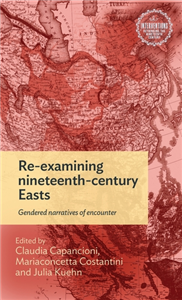Your Search Results
-
Promoted Content
-
Promoted ContentHumanities & Social SciencesSeptember 2018
Learning femininity in colonial India, 1820–1932
by Tim Allender, Andrew Thompson, John M. MacKenzie
Learning femininity in colonial India explores the colonial mentalities that shaped and were shaped by women living in colonial India between 1820 and 1932. Using a broad framework the book examines the many life experiences of these women and how their position changed, both personally and professionally, over this long period of study. Drawing on a rich documentary record from archives in the United Kingdom, India, Pakistan, North America, Ireland and Australia this book builds a clear picture of the colonial-configured changes that influenced women interacting with the colonial state. This book will appeal to students and academics working on the history of empire and imperialism, gender studies, postcolonial studies and the history of education.
-
 Trusted Partner
Literature & Literary StudiesNovember 2021
Trusted Partner
Literature & Literary StudiesNovember 2021Practising shame
Female honour in later medieval England
by Mary C. Flannery, Anke Bernau, David Matthews
Practicing shame investigates how the literature of medieval England encouraged women to safeguard their honour by cultivating hypervigilance against the possibility of sexual shame. A combination of inward reflection and outward comportment, this practice of 'shamefastness' was believed to reinforce women's chastity of mind and body, and to communicate that chastity to others by means of conventional gestures. The book uncovers the paradoxes and complications that emerged from these emotional practices, as well as the ways in which they were satirised and reappropriated by male authors. Working at the intersection of literary studies, gender studies and the history of emotions, it transforms our understanding of the ethical construction of femininity in the past and provides a new framework for thinking about honourable womanhood now and in the years to come.
-
 Trusted Partner
The ArtsNovember 2011
Trusted Partner
The ArtsNovember 2011Nationalising Femininity
Culture, sexuality and British cinema in the Second World War
by Christine Gledhill
Case studies examine competing definitions of feminism, contoured by The Second World War, circulating in cinema, women's magazines, social policies, government pamphlets, fashion, and broadcasting ;
-
 Trusted Partner
Trusted Partner
-
 Trusted Partner
Literature & Literary StudiesFebruary 2000
Trusted Partner
Literature & Literary StudiesFebruary 2000Feminism, femininity and popular culture
by Joanne Hollows
Accessible, introductory student guide which identifies key feminist approaches to popular culture from the 1960s to the present.. The only introduction to both feminist cultural studies and feminism and popular culture published in the UK.. Presents its information in a reader friendly series of case studies on: women's film romantic fiction soap opera consumption and material culture fashion and beauty proactices youth culture and popular music. Will appeal to students across a wide range of disciplines as a variety of popular cultural forms are discussed. ;
-
 Trusted Partner
Trusted Partner
-
 Trusted Partner
Humanities & Social SciencesMay 2016
Trusted Partner
Humanities & Social SciencesMay 2016Learning femininity in colonial India, 1820–1932
by Tim Allender, Andrew Thompson, John Mackenzie
-
 Trusted Partner
Humanities & Social SciencesSeptember 2020
Trusted Partner
Humanities & Social SciencesSeptember 2020Queer Muslim diasporas in contemporary literature and film
by Alberto Fernández Carbajal, Amina Yaqin
-
 Trusted Partner
Literature & Literary StudiesNovember 2019
Trusted Partner
Literature & Literary StudiesNovember 2019Practicing shame
by Mary C. Flannery, Anke Bernau, David Matthews
-
 Trusted Partner
Trusted Partner
-
 Trusted Partner
August 2019
Trusted Partner
August 2019Marcel Proust und die Frauen
18. Publikation der Marcel Proust Gesellschaft
by Barbara Vinken, Sprenger Ulrike, Ulrike Sprenger
Ohne die Frauen ist Prousts Schreiben nicht zu verstehen. Bereits in der Eingangsszene der Recherche ist Imagination mit Weiblichkeit verknüpft, wenn der Träumer eine Frau halluziniert, die aus einer falschen Lage seines Schenkels heraus geboren wird, so wie Eva einer Rippe Adams entsprungen ist. Schließlich identifiziert sich der Erzähler selbst mit einer Frau, wenn er mit dem Buch, das er im Begriff zu schreiben ist, »schwanger« geht. Das Weibliche ist so nicht nur Bestandteil des Romans, sondern konstitutiv für Prousts Schreiben selbst, das man eine écriture au féminin nennen könnte.Wie kein anderer vor und nach ihm erforscht Proust zudem das Rätsel weiblichen, genauer lesbischen Begehrens. Albertine ist kein Mann in weiblicher Verkleidung, sondern Figur des Femininen par excellence – Figur des Flüchtigen, Opaken, Fragmentarischen und somit Inbegriff von Prousts Modernität. Der vorliegende Band versammelt die Beiträge des internationalen wissenschaftlichen Symposions, das die Marcel Proust Gesellschaft 2017 in München veranstaltet hat. Nicht nur biografische Quellenforschung, sondern Prousts weibliches Schreiben und sein Schreiben des Weiblichen stehen im Mittelpunkt der Untersuchungen.
-
 Trusted Partner
August 2019
Trusted Partner
August 2019Marcel Proust und die Frauen
18. Publikation der Marcel Proust Gesellschaft
by Barbara Vinken, Ulrike Sprenger
Ohne die Frauen ist Prousts Schreiben nicht zu verstehen. Bereits in der Eingangsszene der Recherche ist Imagination mit Weiblichkeit verknüpft, wenn der Träumer eine Frau halluziniert, die aus einer falschen Lage seines Schenkels heraus geboren wird, so wie Eva einer Rippe Adams entsprungen ist. Schließlich identifiziert sich der Erzähler selbst mit einer Frau, wenn er mit dem Buch, das er im Begriff zu schreiben ist, »schwanger« geht. Das Weibliche ist so nicht nur Bestandteil des Romans, sondern konstitutiv für Prousts Schreiben selbst, das man eine écriture au féminin nennen könnte.Wie kein anderer vor und nach ihm erforscht Proust zudem das Rätsel weiblichen, genauer lesbischen Begehrens. Albertine ist kein Mann in weiblicher Verkleidung, sondern Figur des Femininen par excellence – Figur des Flüchtigen, Opaken, Fragmentarischen und somit Inbegriff von Prousts Modernität. Der vorliegende Band versammelt die Beiträge des internationalen wissenschaftlichen Symposions, das die Marcel Proust Gesellschaft 2017 in München veranstaltet hat. Nicht nur biografische Quellenforschung, sondern Prousts weibliches Schreiben und sein Schreiben des Weiblichen stehen im Mittelpunkt der Untersuchungen.
-
 Trusted Partner
Trusted Partner
-
 Trusted Partner
Trusted Partner
-
 Trusted Partner
Medieval historyMarch 2003
Trusted Partner
Medieval historyMarch 2003Medieval maidens
Young women and gender in England, 1270–1540
by Kim M. Phillips
The first study on medieval women to treat young women or 'maidens' separately and at length. The book makes a contribution to gender studies through its study of medieval girls' acquisition of appropriate roles and identities, and their own attitudes towards these roles. Examines the experiences and voices of young womanhood. Provides insights into ideals of feminine gender roles and identities at different social levels.
-
 Trusted Partner
Humanities & Social SciencesAugust 2023
Trusted Partner
Humanities & Social SciencesAugust 2023Forensic cultures in modern Europe
by Willemijn Ruberg, Lara Bergers, Pauline Dirven, Sara Serrano Martínez
This edited volume examines the performance and role of scientific experts in modern European courts of law and police investigations. It discusses cases from criminal, civil and international law to parse the impact of forensic evidence and expertise in different European countries. The contributors show how modern forensic science and technology are inextricably entangled with political ideology, gender norms and changes in the law and legal systems. Discussing fascinating case studies, they highlight how the ideology of authoritarian and liberal regimes has affected the practical enactment of forensic expertise. They also emphasise the influence of images of masculinity and femininity on the performance of experts and on their assessment of evidence, victims and perpetrators. This book is an important contribution to our knowledge of modern European forensic practices.
-
 Trusted Partner
Humanities & Social SciencesMay 2020
Trusted Partner
Humanities & Social SciencesMay 2020Imagining Caribbean womanhood
Race, nation and beauty competitions, 1929–70
by Pamela Sharpe, Rochelle Rowe, Penny Summerfield, Lynn Abrams, Cordelia Beattie
Over fifty years after Jamaican and Trinidadian independence, Imagining Caribbean womanhood examines the links between beauty and politics in the Anglophone Caribbean, providing a first cultural history of Caribbean beauty competitions, spanning from Kingston to London. It traces the origins and transformation of female beauty contests in the British Caribbean from 1929 to 1970, through the development of cultural nationalism, race-conscious politics and decolonisation. The beauty contest, a seemingly marginal phenomenon, is used to illuminate the persistence of racial supremacy, the advance of consumer culture and the negotiation of race and nation through the idealised performance of cultured, modern beauty. Modern Caribbean femininity was intended to be politically functional but also commercially viable and subtly eroticised.
-
 Trusted Partner
Literature & Literary StudiesApril 2026
Trusted Partner
Literature & Literary StudiesApril 2026Re-examining nineteenth-century Easts
Gendered narratives of encounter
by Claudia Capancioni, Julia Kuehn, Mariaconcetta Costantini
Re-examining nineteenth-century Eastscontributes novel approaches to gendered and gendering fictions and travel writing in and of the cultural-geographical-ideological contexts surrounding nineteenth-century Easts. It examines underexplored stories of travel and narratives of encounter to reconsider the western allure of travelling to the Easts - from the Balkans to the Middle and Far East, through a range of diverse critical approaches. It discusses writers - travellers, novelists, and short-story writers - who authored texts based on their varied experiences in eastern lands. It also analyses how views of eastern places became a rich source of material for identity formations related to Empire but also discussions about masculinity and femininity at 'home'.
-
 Trusted Partner
Literature: history & criticismJanuary 2017
Trusted Partner
Literature: history & criticismJanuary 2017Conversions
Gender and religious change in early modern Europe
by Edited by Simon Ditchfield, Helen Smith
Conversions is the first collection to explicitly address the intersections between sexed identity and religious change in the two centuries following the Reformation. Chapters deal with topics as diverse as convent architecture and missionary enterprise, the replicability of print and the representation of race. Bringing together leading scholars of literature, history and art history, Conversions offers new insights into the varied experiences of, and responses to, conversion across and beyond Europe. A lively Afterword by Professor Matthew Dimmock (University of Sussex) drives home the contemporary urgency of these themes and the lasting legacies of the Reformations. Of interest to scholars of early modern history, literature, and architectural history, this collection will appeal to anyone interested in the vexed history of religious change, and the transformations of both masculine and feminine identity.



